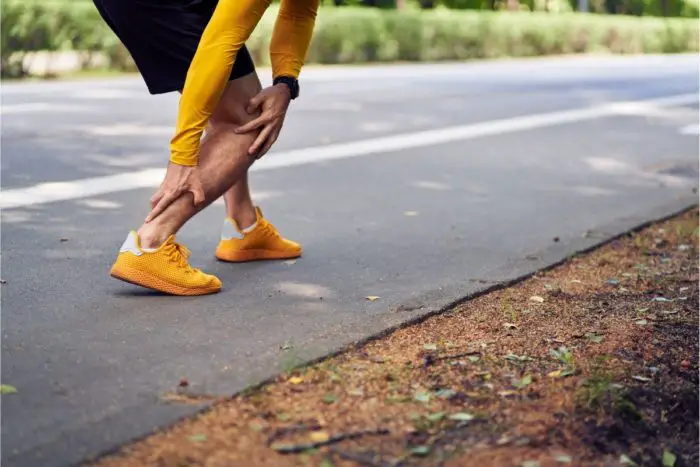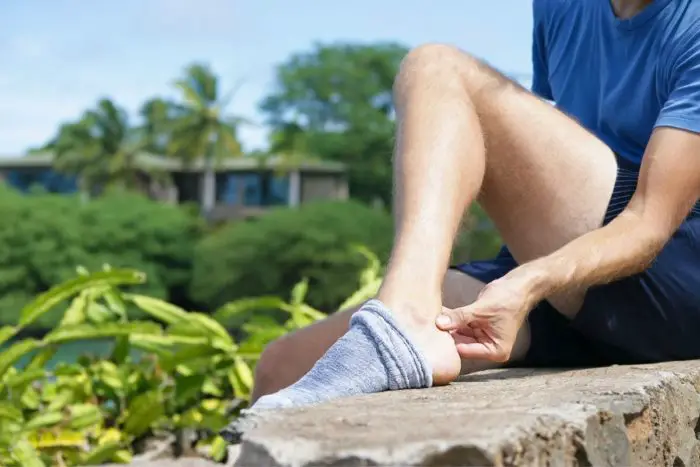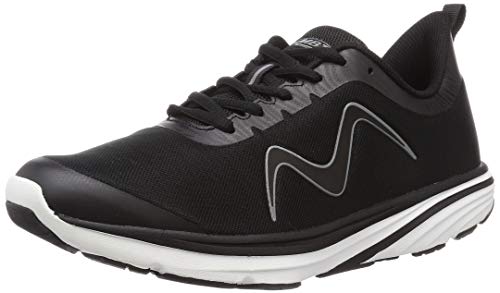When you are dealing with Achilles Tendonitis, it can be difficult to find running shoes that will not aggravate the injury.
If you are having issues with your Achilles, it’s important to consult your doctor before making any changes to what shoes you wear. However, there are some ways that you can potentially help relieve or prevent discomfort while wearing certain types of shoes.

Read on for more information about how to find the right pair of running shoes for Achilles Tendonitis!
Jump to your Favorite Section
Best Running Shoes for Achilles Tendonitis
1. MBT Rocker Bottom Shoes
- ROCKER BOTTOM SHOE – From the point your heal first hits the ground until your toes leave it, the curved sole of the MBT rocker shoe matches the natural movement of your foot while giving the same stability as a traditional running shoe. The gentle roll promotes a natural cushioning to your feet and the angle of the PivotAxis, critical to the Pivot Strike location at the midfoot, provides the ideal foot striking platform to transition into propulsion or a forward movement while enhancing support
- TECHNOLOGY IN THE SHOE – MBT’s proprietary SensorTechnology in the heel produces a natural cushioning required by a short or long-distance runner. The PivotAxis Technology promotes balance and a natural movement that with each stride activates muscles required by the top performing runners. The lasting board and engineered shank are specially developed for the MBT sole construction which provides comfort & support
- CREATED WITH STABILITY IN MIND – The stability of the MBT shoe is identical to any high-quality running or walking shoe and the only roll you feel is from your heal to your toes. There is no side to side roll so run or walk with confidence. The Tri-density Midsole features extensive cushioning that allows for a better ride and for added support and strength most models include MBT’s injection molded Heel Counter
According to our research one of the best – if not the best – running shoe for Achilles Tendonitis is the MBT Rocker because shoe’s curving sole follows your natural foot movement, giving the same stability as a conventional walking shoe from the moment your heal first strikes the ground until your toes depart it. The mild roll encourages a natural cushioning to your feet.
Also, the inside of the shoe has a proprietary MBT’s technology called SensorTechnology which helps create a natural cushioning for the heel, really useful when dealing with Achilles Tendonitis.
A downside from MBT’s shoes in general is that they are not as popular as other brands we will be mentioning below, so information about the shoe is limited but reading some reviews and details about how the shoe is built makes us believe this is one of the top running shoes for Achilles Tendonitis.
2. Brooks Ghost 13
- THIS MEN'S SHOE IS FOR: The Ghost 13 is for runners looking for a reliable shoe that's soft and smooth. The Ghost 13 offers improved transitions for zero distractions so you can focus more on what matters most: your run. This Brooks Ghost 13 is a certified PDAC A5500 Diabetic shoe and has been granted the APMA Seal of Acceptance.
- SUPPORT AND CUSHION: The neutral support type provides high energizing cushioning. Ideal for road running, cross training, the gym or wherever you might want to take them! Predecessor: Ghost 12
- BALANCED, SOFT CUSHIONING: BioMoGo DNA and DNA LOFT cushioning work together to provide a just-right softness underfoot without losing responsiveness and durability - yet it feels lighter than ever.
The next great option for Running Shoes for Achilles Tendonitis are the Brooks Ghost 13. They have been known for years for helping with Achilles Tendonitis and the only reason why we didn’t put them on in the first place is because there is a new version of these shoes, the Ghost 14 but there is not much information about them yet so we couldn’t tell if those were better. But if you don’t mind getting an old model the Brooks Ghost 13 is good for you!
How do these shoes help your heel? They come with a BioMoGo DNA and along with the DNA LOFT cushioning help to give you the right softness under the foot without having to lose any responsiveness or durability. The DNA LOFT extends beyond the heel so they are even more comfortable.
Also the Brooks Segmented Crash Pad implemented in these shoes will provide cushioning from heel to toe on every step.
The only con with this pair of shoes is that there is a new version of them, they might be better than the Ghost 13 but at the time of our review we can’t tell yet.
3. Asics Gravity Defyer
- Hybrid VersoShock Technology A smart pain relief cushioning and recovery technology that combines our patented pain relieving VersoShock with the full-sole shock absorption of our exclusive VersoCloud spring cell sole.
- Micro Fiber Leather Upper Step cool and secure with our light, eco-friendly, leather with outstanding abrasion resistance and high tear strength. Excellent flexibility and elasticity for any instep.
- Front Rolling Design Smooth movement and stability. Designed to reduce foot stress by isolating 28 bones, 30 joints, and over 100 muscles from harm.
The Asics Gravity Defyer is another good shoe for the people who run short distances or want to use them for cross-training. The technology used in them for comfort and support are great for Achilles Tendonitis if you are not a pro runner.
One of the main reasons why they work so well is because Asics have combined their pain relieving technology with shock absorption patents creating a super comfortable shoe.
The insoles in the shoe are removable in case you need a different kind of support but Asics are known for making good and comfortable shoes for years, so you will likely like them.
So the only con we mentioned earlier is that these are not for long distance runners or pro’s but if you run short distances or just to warm up and then do a different type of exercise, then this might be all you need.
How to choose the best Running Shoes for Achilles Tendonitis?
Arch support in Shoes for Achilles Tendonitis
While women’s shoes are generally built to have a lower arch than men’s shoes, few people understand how this can affect your foot health. If you have flat feet or low arches, it is likely that the bony protuberance at the back of the foot feels discomfort when it makes contact with the shoe because there just isn’t enough room in the shoe.
If you have flat feet or low arches, look for shoes that provide better arch support to help keep your foot in a neutral position. Shoes with removable insoles are also great because it’s easy just to replace the factory insole with an after-market insert made specifically for your needs.
Heel cushioning in Shoes for Achilles Tendonitis
Achilles Tendonitis is caused by micro-tears in the tendon which are often irritated further when you increase your mileage quickly.
If you’ve developed Achilles Tendonitis, look for running shoes with superior heel cushioning to help absorb some of that shock during landings and keep it from irritating your Achilles Tendonitis.
Stability features in Shoes for Achilles Tendonitis
When you’re looking for running shoes to support your foot, look for companies that offer stability features like a medial post or enhanced cushioning.
A medial post (or “dual density posting”) is an extra piece of material on the inside of the shoe which helps to provide stability and control over pronation – when the ankle rolls inward too far during the gait cycle.
How much mileage for Shoes for Achilles Tendonitis?
It is important to know the mileage of your running when choosing an appropriate running shoe, especially if you suffer from Achilles Tendonitis.
While it might be easy to choose a shoe by brand name, knowing your mileage helps you know how much comfort your shoes will provide before they need to be replaced.
Normally, experts recommend that people with Achilles Tendonitis replace their running shoes every 300 miles. However, if you are trying to take care of your injury while still maintaining a high level of running, you might want to replace your shoes more often.
It is important that you choose the best Running Shoes for Achilles Tendonitis because it will help with recovery and make your experience much better.
Remember, if you are experiencing any pain while wearing your new shoes, you should take them off immediately and visit your doctor.
Where would you use the Shoes for Achilles Tendonitis
If you’re only going to be running on pavement then light weight trainers are best; if you plan on running off-road then trail running shoes would be better suited.
Different sports affect your feet in different ways. For example, cycling shoes are designed to provide extra grip and stability as you pedal because there is nothing between the feet and the pedals. This type of shoe is much stiffer than a running shoe which creates more movement through the midsole as it absorbs impact from the road or treadmill.
What is Achilles Tendonitis?
Achilles Tendonitis is an injury to the tendon which attaches your calf muscles (gastrocnemius and soleus) to the bone in your heel (calcaneus).
The pain typically occurs near where the tendon inserts into the back of your ankle or at its attachment to the heel. The inflammation associated with Achilles Tendonitis is similar to what you might feel if you overused or injured any other part of your body.
What causes Achilles Tendonitis?
Achilles Tendonitis occurs because of small tears in the tendon, usually caused by overuse. These are micro-tears which are the result of tiny bursts of strain on your body during activity that can cause damage if not given time to heal.
When you over-exercise, the muscles and tendons in your legs are put under immense stress. During exercise, these tissues become overloaded even if it’s just with regular daily activities like walking or running.
Achilles Tendonitis is most common among runners because every time they take a stride their leg has to absorb shock and stress. However, it can occur in any intensely active person who is pushing their legs too much, especially if they are not following a well-rounded exercise regimen.
Achilles Tendonitis Symptoms
Achilles Tendonitis tends to be fairly painful and typically presents as a pain along the back of your ankle and heel. This can start out as a dull ache, but it won’t take long before the pain intensifies into severe discomfort that makes it hard to walk or run.
There will also be stiffness and tenderness to the touch in this area.
In more severe cases, the tendon might swell and you could develop a noticeable bump on your back ankle. If left untreated, Achilles Tendonitis can get worse and result in a partial tear of the tendon.
How to treat Achilles Tendonitis?
Achilles Tendonitis is very common among runners, but it can also be found in people who play a lot of tennis, soccer or basketball.
If you have had Achilles Tendonitis before, you are more likely to develop it again if your lifestyle remains the same.
In some cases, the pain might be so severe that any running will cause too much stress on the tendon and make the injury worse.
If you want to improve your chances of recovery, you should follow a well-rounded exercise plan and not spend too much time on just one sport.
You might also need to try other methods like ultrasounds to speed healing along.

Conclusion
When it comes to running shoes, the type of shoe you choose could have a significant impact on your comfort level. For instance, if you are dealing with Achilles tendonitis or plantar fasciitis, it’s important that you start out by talking to your doctor about what types of shoes might be best for you before making any changes in footwear.
However, there are some ways that you can potentially help relieve or prevent discomfort while wearing certain types of shoes.
We hope our recommendations above have helped you choose the best Running Shoes for Achilles Tendonitis problems.



